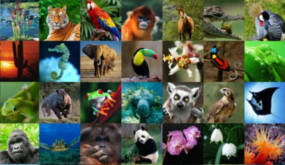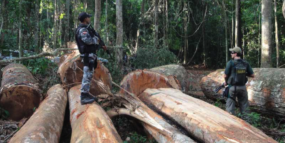Posted on 08 May 2015
Abajo la versión en español
The populations of West Africa, home to one of the world’s most resource-rich marine environments, is suffering widespread poverty and a paucity of legitimate livelihoods in part due to high levels of foreign illegal fishing and overfishing.
When local fish stocks collapsed in Senegal in 2005, about 5,000 West Africans fled poverty to the Canary Islands in wooden handmade boats that the fishermen couldn’t afford to use commercially anymore. The following year, that number climbed to more than 31,000 migrants. In 2006, an estimated 6,000 West Africans lost their lives attempting to pursue a better future in Europe. Most of these migrants were from Senegal and Mauritania, the countries with which the EU has its largest and oldest fisheries agreements. The roots of the current illicit migration crisis in the Mediterranean is, in many ways, a crisis of Europe’s own making.
The following photo essay is based on original research in West Africa by Kukka Ranta and documents this story:
[SlideDeck2 id=11161 iframe=1 width=”100%” height=”480″]
West Africa is estimated to have the highest levels of illegal, unreported and unregulated (IUU) fishing on Earth. Foreign vessels are taking advantage of some of the world’s poorest countries, which can’t afford to guard their own territorial waters and where the corruption index is often among the highest in the world.
Since the world’s leading fishing powers have emptied their own waters, the problem of industrial overfishing is being exported to distant seas. The European Union made its first bilateral fishing agreement in Africa with Senegal in 1979, and soon afterwards Chinese trawlers and other Asian vessels entered West African waters, many of them operating illegally. Many of the vessels involved in illegal activities in West Africa are operating under flags of convenience. According to the Environmental Justice Foundation, a significant number of these vessels are originally owned by European companies.
West African coastal states are losing $1.3 billion annually and 37 % of their annual catch to IUU fishing. Most of the illegally-caught fish is taken to the EU and China, the world’s biggest fish markets, where demand is constantly growing. At the same time, industrial overfishing is destroying the livelihoods and food security of some of the world’s poorest people, forcing them to seek new, and hopefully more secure futures elsewhere.
Photo credits and research: Kukka Ranta.
Migración Ilícita a Europa: Las consecuencias de la pesca ilegal y la sobrepesca en África Occidental.
La población de África Occidental, cuna de uno de los ambientes marinos más ricos del mundo, padece de una pobreza generalizada y de una escasez de sustento legítimo, en parte debido a los altos niveles de pesca ilegal y de sobrepesca.
Cuando la población mundial de peces colapsó en Senegal en 2005, alrededor de 5.000 ciudadanos del oeste de África huyeron de la pobreza hacia las Islas Canarias en botes artesanales de madera que los pescadores ya no podían utilizar con fines comerciales. El año siguiente, la cifra escaló a más de 31.000 migrantes. En 2006, se estima que 6.000 ciudadanos de África Occidental perdieron su vida intentando buscar un futuro mejor en Europa. La mayoría de estos migrantes eran de Senegal y Mauritania, países con las cuales Europa tiene los más grandes y antiguos acuerdos pesqueros. Las raíces de la actual crisis migratoria en el Mediterráneo es, de muchas formas, una crisis que Europa misma creó.
La siguiente presentación de fotografías está basada en investigación original en África Occidental, realizada por Kukka Ranta, y documenta la historia:
[SlideDeck2 id=11161 iframe=1 width=”100%” height=”480″]
Se estima que África Occidental recibe los mayores niveles de pesca ilegal, no informada y no reglamentada en todo el mundo. Los buques extranjeros están sacando provecho de uno de los países más pobres del mundo, que no puede hacerle frente al gasto que significa vigilar sus propias aguas territoriales, y en donde el índice de corrupción suele estar entre los más altos del mundo.
Desde que las principales potencias pesqueras del mundo han vaciado sus propias aguas, el problema de la sobrepesca industrial está siendo exportado a mares distantes. La Unión Europea concretó su primer acuerdo bilateral con Senegal relativo a la pesca en África en 1979, y poco después ingresaron barcos pesqueros de origen chino y otros buques asiáticos a las aguas del oeste africano, varios de ellos operando ilegalmente. Muchos de los buques involucrados en actividades ilegales en África Occidental operan bajo las banderas más convenientes. De acuerdo con la Fundación de Justicia Ambiental, un número considerable de estos buques son propiedad de empresas europeas.
Los países de la costa oeste africana están perdiendo US$1.300 millones anuales y el 37% de su pesca anual por culpa de la pesca ilegal, no informada y no reglamentada. La mayoría de estos peces ilegalmente obtenidos es llevada a la UE y a China, los mayores mercados pesqueros a nivel mundial, en donde la demanda crece a un ritmo constante. Al mismo tiempo, la sobrepesca industrial está destruyendo el sustento y la seguridad alimenticia de una de las comunidades más pobres del mundo, forzándolos a ir tras un nuevo y posiblemente mejor futuro en cualquier otro lugar.
Fotografía e investigación: Kukka Ranta.



